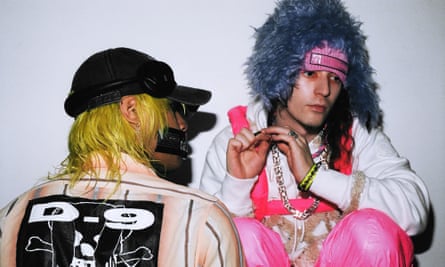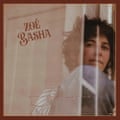As one quarter of the Swedish underground-ish rap collective Drain Gang, Bladee (pronounced Blade) spent his 20s on the frontlines of a hyper-online youth culture. But as his 30th birthday loomed, the musician born Benjamin Reichwald started to sweat. His anxiety about ageing, a serious depressive spell, and the mixed reception to his latest album, spiralled into a crisis: were he and his Drain Gang peers “permanently frozen as 20-year-olds because we came up at a certain time of our lives”, he wondered. Was he already past it at 29?
“I got so old, I got embarrassed to be even here,” Reichwald sings on his newest album, Cold Visions. Older readers may roll their eyes, but given Reichwald has built up one of the most ardent young fanbases in music, this was a valid worry. “I had a lot to get off my chest,” he says now. “I was thinking a lot about my position and I felt stuck – do I have to be perceived as an artist to feel fulfilled? I’m chasing that and it doesn’t give me anything. So why am I doing this?”
Reichwald has a reputation for being elusive (this is one of the very few solo interviews he has ever done) and frequently obscures his face. Lately he has favoured corpse paint, blood-red grills for his teeth and a chaotic assemblage of bandanas, sunglasses and Oakley hats. But during a two-hour conversation in a Brooklyn hotel room, in Gucci sneakers and a T-shirt with the logo of Norwegian black metal band Satyricon, he is thoughtful and forthcoming.
Despite his worries, being 30 has treated Reichwald well. In March he released Psykos, a rock-leaning collaboration with his fellow Swedish rapper and long-term friend and collaborator Yung Lean, who also featured on Cold Visions, which was released the following month. In October, they both appeared on Charli xcx’s Brat remix album, with Bladee reworking the song Rewind. “It’s a Bladee verse, I did my thing,” is how he modestly describes his contribution, but he speaks more effusively of Charli: “I have eternal respect for her. She put me in this context with all these other people” – Ariana Grande, Lorde and Billie Eilish all appear on the remix record – “and I’m very grateful to be involved.”
It caps a big year for Reichwald. Released a decade after his debut mixtape, Cold Visions is his most fully realised project yet. Made in two weeks in his house in Stockholm, the album is, he says, “really honest, more like a diary”. In the course of 30 songs, he purges his demons over raging, blown-out trap beats. Brain cells fried into oblivion, he navigates panic attacks and self-loathing, calls himself “the king of nothing matters” and raps about “violently drug abusing weed”. In one line he’s working out and getting tanned in LA, the next “I’m crashing down some like a wave over castles made of sand.”
Cold Visions was self-released after Reichwald split from Year0001, Drain Gang’s longtime label and management company. “I don’t really care any more about being a bigger artist,” he says. “The only thing that’s important is that I’m doing something that’s true to me.”
The Drain Gang collective – Bladee, Ecco2K, Thaiboy Digital, and Whitearmor – have been best friends since their teens, playing around with Auto-Tune, and freestyling in the vein of idiosyncratic US rappers such as Lil B and Chief Keef. Early Bladee tracks – overcast cloud rap about crushed hearts, pills and dreams – were so digitally processed that they passed through the uncanny valley and ended up somewhere strangely melodic and emotive. “I hated to hear my voice without the Auto-Tune,” Reichwald says. “It’s how we found our sound. Without it we wouldn’t have committed to doing it – it sounded too bad.”
The group cycled through a number of names before landing on Drain Gang, inspired by a nihilistically gothic sentiment later articulated in Bladee’s song Be Nice 2 Me: “Take a knife and drain your life.” They quickly found kindred spirits in Sad Boys, a local crew featuring Yung Lean. In 2014, Lean’s melancholic and memeable hip-hop was taking the internet by storm, and Reichwald quit his job at a kindergarten to join him on tour.
By April 2015, barely out of his teens, Reichwald was living with Lean in Miami, where working on music came second to partying and drug use. One evening, Lean suffered drug-induced psychosis; Reichwald called the ambulance which probably saved his life. Hours later, Barron Machat, Lean’s 27-year-old manager, died in a car accident on his way to the hospital; Xanax was found in his system. “Things were building to a point where something was going to happen because of how we were living,” Reichwald says. “We didn’t think that anything could go wrong, we were so in this drugs and rock star lifestyle. Someone was probably always gonna die with how we were moving. It was very reckless, but we were so young, we just didn’t know.”
Reichwald returned to Sweden and worked at a shampoo factory while suffering from PTSD and struggling to process Machat’s death and Lean’s deteriorating mental health. “I was not really OK,” he says. Reichwald says it took him a long time to understand that he and his friends had autonomy over their surreal new lives as successful rappers. “I sometimes felt like, ‘I shouldn’t be here, so I have to do what everyone says.’ I didn’t understand that I had any value in the situation. I didn’t understand why people would like my music. I thought there must be some kind of misunderstanding. But now, I’ve done it for so long and I actually know what I’m doing. I believe more in my ability.”
His music remained dark and dissociative for a good while, but the clouds began to part around 2020. While Reichwald’s persona had long swung between mall rat and mystic, his spiritual side became more pronounced as his music grew brighter. Fans started to wonder if he had experienced some sort of transformative near-death experience because, in 2019, he had mentioned that he’d been struck by lightning in Thailand. Or at least he thinks that’s what happened. “Either I had a random seizure from seeing the lightning or I got struck by it.” Whatever it was, “something definitely changed around that time”.
Drain Gang’s angst once enticed a considerable number of nihilistic, male online edgelords, but their fanbase has evolved as their music has become more euphoric, frequently going viral on TikTok during the pandemic. Most of the crowd at a recent show were dressed in distressed black clothes like Reichwald; they were mainly so young that fans older than 26 were given their own fast-track queue as if they needed elderly care.
Reichwald says that he is uncomfortable with being idolised, but understands the way that belonging to a subculture can be life-affirming. Even before his teens, he formed a punk band with Ecco2K after seeing someone with a studded leather jacket and thinking: “I want to be like that. But,” he adds, “you need to find yourself within all that.”

He allows himself a little pride in the way Drain Gang have built and maintained their singular corner of music. “We still don’t feel like someone is doing what we’re doing, better,” he says. “I would love to hear someone take it to the next level with a new perspective, someone young. I feel like that’s the point of it – you can keep the idea going.”
He’s now looking beyond Cold Visions to his own future. “I want to become a better person,” he says with a sweetly earnest laugh. “I want to have a brighter outlook and work on liking myself more. I’m sick of thinking about myself; I would like to be more outside my head.” After several years spent getting “sick all the time”, he is “trying to be sober and healthy”. Lately he’s been experimenting with songwriting in Swedish, and working on abstract paintings in his art studio. Ultimately, he finds solace in the act of creating. “Even in my sadder music,” he says, “I’m striving for joy.”
Source: theguardian.com


